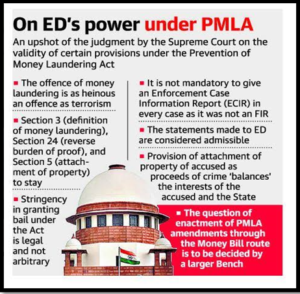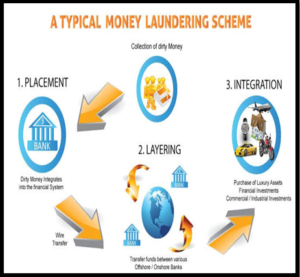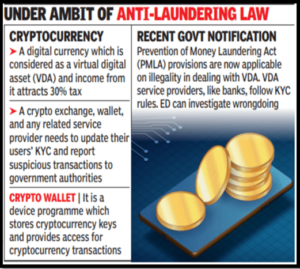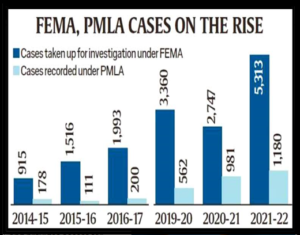QUESTIONABLE SEARCHES UNDER THE MONEY LAUNDERING ACT
Syllabus:
GS 2 : Issues and challenges pertaining to the federal structure.
Why in News:
Supreme Court of India limits application of Prevention of Money Laundering Act, 2002 to “proceeds of crime”
Source- ToI
The editorial critically examines the enforcement and interpretation of the Prevention of Money Laundering Act (PMLA), 2002, focusing on its impact on legal principles and federalism in India. It scrutinizes the Supreme Court’s rulings, the Enforcement Directorate’s (ED) practices, and the implications for governance and constitutional integrity.
What is Money Laundering?
Money Laundering is a criminal process of concealing the origins of illicitly obtained funds, typically by means of complex financial transactions. It involves creating a seemingly legitimate source for the unlawfully acquired money, making it difficult for authorities to trace its illicit roots. This practice enables criminals to integrate ‘cleaned’ funds into the legitimate economy without arousing suspicion.
About the Prevention of Money Laundering Act (PMLA):
The Act was enacted in 2002 in response to India’s global commitment, including the Vienna Convention, to combat money laundering.
- Purpose of PMLA: The PMLA is designed to prevent money laundering and enable the confiscation of assets linked to money laundering activities.
- Objectives of the Act:
- Prevent money laundering.
- Deter the funnelling of funds into illegal activities and economic crimes.
- Allow for the seizure and confiscation of properties involved in money laundering.
- Address matters related to money laundering.
- Enforcement Directorate’s (ED)role : The ED, operating under the Department of Revenue, Ministry of Finance, is responsible for investigating money laundering offenses as per the PMLA.
- Financial Intelligence Unit (FIU-IND): The FIU-IND, under the Department of Revenue, serves as the central national agency for receiving, processing, analyzing, and disseminating information related to suspicious financial transactions.
- Investigation of Scheduled Offenses: Agencies specified in relevant acts, such as local police, CBI, customs departments, SEBI, or other investigative agencies, investigate scheduled offenses separately.
- Actions Against Offenders: Individuals involved in money laundering may face the following consequences:
- Seizure and freezing of property and records.
- Attachment of property acquired through criminal proceeds.
- Penalties, including rigorous imprisonment for a minimum of three years, extendable up to seven years, and fines with no specified limit.
Source- The Times of India
Supreme Court’s Stance on PMLA
- Narrow Interpretation: The Supreme Court in Vijay Madanlal Choudhary vs. Union of India (2022) restricted PMLA’s scope to the illegal gains of property from specific criminal activity associated with scheduled offenses.
- Defining “Proceeds of Crime”: Clarified that “proceeds of crime” under Section 2(1)(u) must directly originate from criminal activity related to a scheduled offense, excluding cases of mere undisclosed income.
- Restrictions on ED’s Powers
- The Supreme Court emphasized that the ED can only take action if there are “proceeds of crime” from scheduled offenses.
- The absence of such proceeds prevents the initiation of any prosecution under the 2002 Act.
- The media has reported cases of ED actions outside its jurisdiction, leading to criticism from the Supreme Court.
- Damning Observations
- The Supreme Court criticized the ED for not exercising its powers impartially and transparently.
- Inconsistencies were noted in the practice of furnishing written copies of arrest grounds to arrested individuals.
- Justices Abhay S. Oka and Pankaj Mithal clarified that “proceeds of crime” are essential for an offense under Section 3 of the PMLA.
Effects on Federalism:
- Some states, governed by the opposition, have witnessed damaging actions against federalism.
- The Mines and Minerals (Development and Regulation) Act, 1957 is not part of the PMLA’s schedule, and its offenses are not “Scheduled Offenses.”
- ED inquiries into illegal sand mining, which falls under state jurisdiction, have caused concern.
- In Jharkhand, the ED initiated investigations without evidence of scheduled offenses or proceeds of crime.
- The High Court’s decision to transfer cases to the CBI raised questions about jurisdiction and due process.
Source: Indian Express
Selective Targeting
- There is a perception of selective targeting by the ED against opposition-ruled states.
- The ED’s inactivity in states governed by the ruling party in centre , despite more significant cases of illegal mining, raises eyebrows.
- This selective approach undermines the principle of federalism.
Abuse of Authority
- The abuse of authority by central investigating agencies and the courts allowing such actions is concerning.
- Investigating non-scheduled offenses without proceeds of crime should not be permitted.
- The inconsistency in addressing such actions in different states highlights a double standard.
- These practices erode the foundation of Indian federalism and democratic principles.
Way Forward:
- Legal Clarity: Amend the Money Laundering Act to provide clear definitions and guidelines.
- Independent Oversight: Establish an independent body to monitor investigative agencies’ actions.
- Consistent Procedures: Ensure uniform arrest procedures nationwide.
- Cooperation: Promote collaboration between central and state agencies.
- Public Accountability: Raise public awareness and encourage accountability.
The recent interpretations and actions under the Prevention of Money Laundering Act have raised significant concerns about the abuse of authority, the erosion of federalism, and the selective application of the law. Upholding the principles of transparency, fairness, and constitutional values in law enforcement is imperative to protect India’s democratic foundations. It is essential to curtail any misuse of power, ensure uniformity in the application of the law, and safeguard the integrity of the nation’s democratic institutions.
Mains Question:
How does the recent Supreme Court interpretation, limiting the application of the Prevention of Money Laundering Act, 2002 to “proceeds of crime,” impact the effectiveness of the Act? Highlight the key challenges and implications (50 words)

 Source- ToI
Source- ToI
 Source- The Times of India
Source- The Times of India Source: Indian Express
Source: Indian Express

